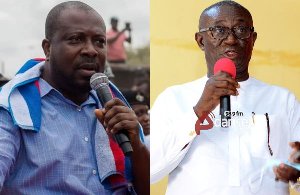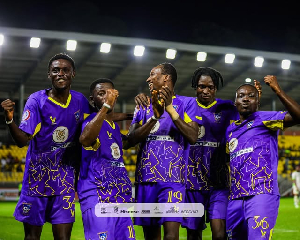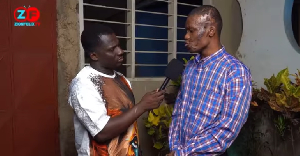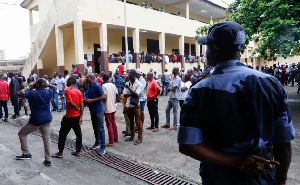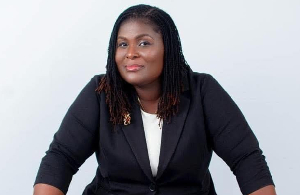There has been great controversy over comments purportedly made by a 'man
on the pulpit' in the Methodist church of Ghana during a visit to that
church by opposition leader Nana Akuffo Addo of the NPP last Sunday. His
comments were varied but suffice it to say that the man on the pulpit
publicly declared himself a member of the opposition new patriotic party
during sermon time on the pulpit whiles asking for the rejection of the
ruling NDCgovernment in the next general election in 2012. Whiles many
members of the NPP are gloating over what they perceive to be a political
plus, many others especially the supporters of the ruling NDC have been
embittered greatly by his remarks. Some have expressed disappointment in the
'man of God' for dabbling in party politics. Government spokesman and deputy
information minister Okudzeto Ablakwa was the first to lament over his
comments from government-expressing absolute disappointment in his Œlack of
neutrality¹ on the pulpit. I have also heard supporters of the Rev. Samuel
Asante Antwi former President of the Methodist church of Ghana say that what
the man did was engaging in 'liberation theology'.
I have my own view of this situation that has been variously observed by
different schools of thought.
First, I don't believe this is the first time a 'man on the pulpit' has
engaged in government criticism.And this particular man is widely known to
have been an open critic of Chairman RAWLINGS during the reviving days of
the PNDC. He was also reported in 2008 to have put on his cell phone a
ringing tone that also served as a campaign signature tune for Nana Akuffo
Addo. Just this time, he was more pronounced in his declaration of support
for the opposition and indeed, his disdain for the ruling party.
Nobody can convince me that his utterances on the pulpit last Sunday
represent liberation theology. Why? What does liberation theology teach? It
teaches that 'Christians must work for social and economic justice for all
people'. If The Rev. Minister is really espousing a liberation theology,
then he ought to be learning from Jean Bertrand Aristide of Haiti whose
liberation theology led to his ex-communication from the Roman catholic
church as a Salesian priest and who continually organized mass protest
against the Jean Claude Duvalier regime and protecting the rights of the
poor in Haiti or take inspiration from the Zapatistas of Mexico who in 1994
took over official buildings in the state capital and proclaiming war for
the 'looting of our natural resources'. Or again, this 'man on the pulpit'
can draw some lessons from the Sandinistas in Nicaragua where some priests
who professed 'liberation theology' decided to join Daniel Ortega and the
urban resistance campaign to oust Anastasio Somozain 1979. That was pure
concrete liberation theology.
That is how far liberation theology is practiced. And I do not think that
the Rev. will want to begin his liberation theology only after he retired as
the president of the Methodist church Ghana. Besides, where was his
liberation theology when President Kuffour's NPP government proclaimed
themselves 'enemies of the poor' in Ghana under a 'property owning
democracy'? Indeed, liberation theology and property owning democracy are
running parallel to each other. Where was his liberation theology when the
military turned Ghana into an experimental state where coups had become so
fashionable and poor people got poorer and social justice got buried until a
certain chairman RAWLINGS came to halt it all with his version of
'liberation theology'? where was Asante Antwi when other clergy joined J.J
Rawlings and the his colleagues to work for economic and social justice for
all in Ghana?
Having said all that, I do want to say that I have nothing in principle
against any man on the pulpit actively and openly engaging in party politics
like the Rev. Samuel Asante Antwi. Indeed, many of them-if not all-are
already engaged covertly in party politics. And as a political youth
activists, I have enough experience to conclude that the real political
actors aren't necessarily the ones who are loud on the campaign platform.
There are many 'hidden hands' whose works for political parties are more
strategic than what Chairman Rawlings, Kuffour, Atta Mills or Akuffo Addo
will do on the campaign platform.
This Rev. has obviously been one of those 'hidden hands' that has influenced
a lot of support for the NPP in that Methodist denomination in Ghana. Is he
the only one? Absolutely no! I know one 'man on the pulpit' who used his
sermon times during the 2008 general elections to campaign for the NPP. How
do I know? Of course I was not in the congregation but my party member who
was also a member of this church left the church in a loud protest-The
church lost a member-and the NPP didn't win more votes as a result.
As I have indicated, there are also other 'men on the pulpit' who were a
part of the PNDC movement in 1979 and are still a part of it now. Just
recently, a priest from east Africa-who espouses liberation theology-joined
believers and adherents to the AFRC/PNDC movement to commemorate 31 years of
the june4 uprising in Tamale. I didn¹t see anything wrong with it.
Severally, many lovers of our true democracy have denounced our religious
leaders for hypocritically keeping mute over glaring social injustice in
Ghana. I have heard the former President Rawlings and many others asking the
'clergy' to not keep quiet over social injustices or during political
upheavals. Interestingly, many of them have decided to make 'selective
comments' as and when it suits them and their interests. And for me, that
behavior by our religious leaders smacks off hypocrisy in the highest order
akin to the biblical Pharisees. It will be really useful and progressive
for our religious leaders to get loud on issues bordering on social and
economic injustice. They must get political when the need arises but they
cannot engage in the usual NPP-NDC politics and call it liberation theology.
They must speak against injustice whether committed by NDC or NPP. After
all, they're already covertly engaged in politics as I have stated already.
People will make arguments about separating church and state. Yes. Let¹s
separate them by all means but we can only have a cosmetic separation like
the one between our 'legislooters' and our executive. We all know that there
is no such real separation of powers between these two arms of government.
So my argument is that all the 'men on the pulpit' must begin to speak
openly about what they feel or see wrong with our social, economic or
political order. If for nothing at all, they will be enriching our
democratic debate, plus, they will be clearing their tainted and Œpharisaic
conscience¹. But let no one even try to convince me that the Rev. Samuel
Asante Antwi, the retired Methodist bishop is pursuing liberation theology
with a sycophantic praise of the opposition leader. For all you know, this
man is covertly negotiating with Nana Akuffo Addo for council of state
position in the unlikely event that ever becomes president of Ghana in 2012.
That will just be a prudent move by the man on the pulpit!
SaCut Amenga-Etego
(YFL General secretary)
Opinions of Tuesday, 17 August 2010
Columnist: Amenga-Etego, SaCut


